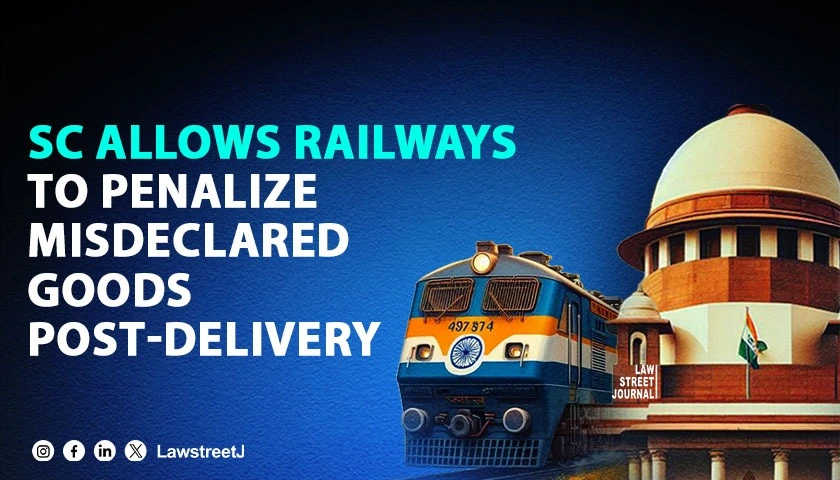New Delhi: The Supreme Court of India has delivered a landmark judgment allowing railway authorities to impose penalties for misdeclared goods even after delivery of consignments, overturning lower court decisions that had restricted such actions.
A bench comprising Justice Sanjay Karol and Justice Prashant Kumar Mishra delivered the judgment in Civil Appeal Nos. 7376–7379 of 2025, emphasizing the Railways’ authority under Section 66 of the Railways Act, 1989.
The appeals stemmed from a decision of the Gauhati High Court in favor of transport companies including Kamakhya Transport Pvt. Ltd., C.M. Traders, Vinayak Logistics, and others, who had challenged railway demand notices issued after the delivery of goods.
The case involved multiple transporters who had received demand notices for alleged misdeclaration of goods sent via Indian Railways. The court noted, “The respondents paid the demands raised and thereafter, preferred separate claim petitions under Section 16 of the Railway Claims Tribunal Act, 1987, before the Railway Claims Tribunal, Guwahati Bench, seeking a refund of the amount paid.”
Initially, both the Railway Claims Tribunal and the Gauhati High Court ruled in favor of the transport companies, ordering refunds of over ₹27 lakhs with 6% annual interest. The lower courts had held that demand notices issued after delivery were illegal under Sections 73 and 74 of the Railways Act, 1989.
However, the Supreme Court distinguished the matter at hand, observing, “The significant point raised by the appellant is that the Courts below have erroneously treated the dispute as one concerning overloading of the wagon, which is governed by Section 73 of the Act. Meanwhile, the appellant’s case is that the consignments were found to be different from what had been declared.”
Interpreting Section 66, the court stated, “No reference is made to the stage at which such a charge can be made, i.e., either before or after delivery. Consequently, it can be seen that the legislative intent was to permit levy of charges under this Section at either stage, and not exclusively at one.”
The court emphasized the difference between various types of penalties under the Railways Act: Section 66 pertains to misdeclaration of goods, while Section 73 deals with overloading. It noted, “It is evident from the contents that the demand was raised for misdeclaration. No reference has been made to overloading, to which Section 73 applies.”
Referring to past interpretations, the court stated, “We find such an approach to be erroneous and not in furtherance of the exposition in Jagjit Cotton Textile (supra)… it was merely a suggestion, to explain the conditions that could be imposed by the Railway Administration under Section 54(1).”
The Supreme Court also cited Section 66(4) of the Railways Act, stating, “If the statement delivered under sub-section (1) is materially false with respect to the description of any goods to which it purports to relate, the railway administration may charge in respect of the carriage of such goods such rate, not exceeding double the highest rate for any class of goods, as may be specified by the Central Government.”
In conclusion, the court ruled:
“In view of the above, the impugned order dated 20th December, 2021 passed by the Gauhati High Court in MFA Nos. 80 of 2016, 57 of 2016, 29 of 2017, and 28 of 2017 is hereby set aside. In the attending facts and circumstances of this case, the civil appeals are allowed.”
Case Title: Union of India vs. M/S Kamakhya Transport Pvt. Ltd. & Ors.

















